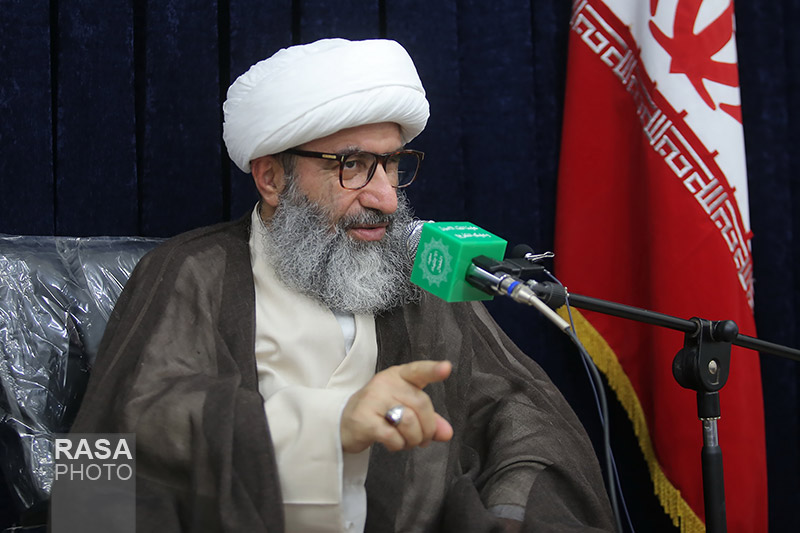Teacher in the Islamic Seminary of Qom:
Rasa – Ayatollah Seyfi-Mazandarani said, “Today, the virtuous people of the Islamic Seminary are obligated to understand that the salvation of the country depends on the principle of Wilayat al-Faqih.”

RNA – Speaking during his class in the Islamic Seminary of Qom, Ayatollah Ali-Akbar Seyfi-Mazandarani referred to the uprising of the people of Qom on 9 January, 1978 and said, “This day marks one of the most important events of the country, especially for the people of Qom.”
The 9 January 1978 protest in the holy city of Qom was against a libelous story about Imam Khomeyni. Opposition to this article culminated in the uprising by the people of Qom during which a number of revolutionary religious students were killed. Once again, this uprising had begun in Qom and within a short space of time had spread to the rest of the country.
The teacher in the Islamic Seminary of Qom added, “The uprising of 9 January wasn’t an ordinary event that we wanted to pass through easily; 9 January was the explosion of the movement of young seminarians and virtuous and revolutionary people and in fact, the victory of the Islamic Revolution is marked from that day.”
He referred to the spontaneous movement of the scholars and virtuous revolutionaries on 9 January 1978 and continued, “The revolutionary movements of the scholars and the people of Qom had begun from the first days and they opposed the imperialist [Pahlavi] monarchy for many days by gathering in the homes of the sources of emulation and scholars and shouted slogans against the monarchy in the streets but the main move took place on 9 January.”
Ayatollah Seyfi-Mazandarani noted that after various meetings and gatherings by the seminarians and the virtuous and revolutionary people of Qom, they gathered in a spontaneous manner in front of the office of Grand Ayatollah Hoseyn Nouri-Hamadani on 9 January and he delivered a very fiery speech and spoke against the monarchy in such a manner that after the speech, the government announced their opposition to the gatherings and massacred a large number of people.
His Eminence said, “By donating their blood on 9 January, the students and people of Qom caused revolutionary movements to take place in other cities and the Islamic Revolution achieved victory. Today, the scholars and virtuous people, just as in the early days of the Revolution, have a duty to support the Islamic Revolution and the Islamic Republic and prevent the internal and external enemies from questioning the Islamic establishment again.”
He added, “Supporting the Supreme Leader [Ayatollah Khamenei] and the position of Wilayat al-Faqih is an essential element for seminarians. Unfortunately, some officials don’t fully understand the position of the Wilayat al-Faqih and this neglect has caused problems as a result of their actions and position the country in a good position in regard to economic and livelihood considerations and people are worried.”
Ayatollah Seyfi-Mazandarani said that there must be a strong response to domestic seditious and malicious foreigners, especially some people in the Islamic Seminary of Qom who deny Wilayat al-Faqih as a discourse and among politicians who oppose it in various ways and don’t know the status of this issue and choose to remain silent. These are the young seminarians and virtuous people of Qom who must create this spark all over the country.”
He stated, “Today, the virtuous people of the Islamic Seminary are obligated to understand that the salvation of the country depends on the principle of Wilayat al-Faqih. If we write it in books but don’t believe in acting upon it, it isn’t sufficient because speaking without action doesn’t have any benefit.”
Ayatollah Seyfi-Mazandarani stated, “Didn’t the Supreme Leader of the Islamic Revolution repeatedly warn about uncontrolled imports? However, he didn’t prohibit the use of foreign goods. In embezzlement cases, he ordered that the embezzlers be dealt with severely but you remained silent. If you had acted upon it, we wouldn’t have reached that position. If only you had acted on these plans and acted flexibly and heroically. The Supreme Leader wasn’t optimistic from the start but you didn’t act in accordance. Instead of being flexible and heroic, you were flexible and passive.”
112/971
Send comment
Please type in your comments in English.
The comments that contain insults or libel to individuals, ethnicities, or contradictions with the laws of the country and religious teachings will not be disclosed